First-generation cephalosporins
| Home | | Medicinal Chemistry |Chapter: Medicinal Chemistry : Antibiotics
i. Cephalexin (Keflex, Keforal) ii. Cefadroxil (Cefadrox, Droxyl, Codroxil) iii. Cephalothin (Keflin) iv. Cefsulodin v. Cephradine
Cephalosporins - Synthesis and Drug Profile
First-generation cephalosporins
i. Cephalexin (Keflex, Keforal)
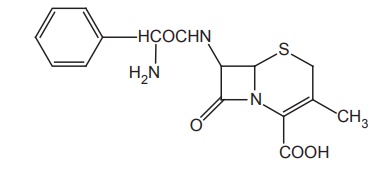
Synthesis
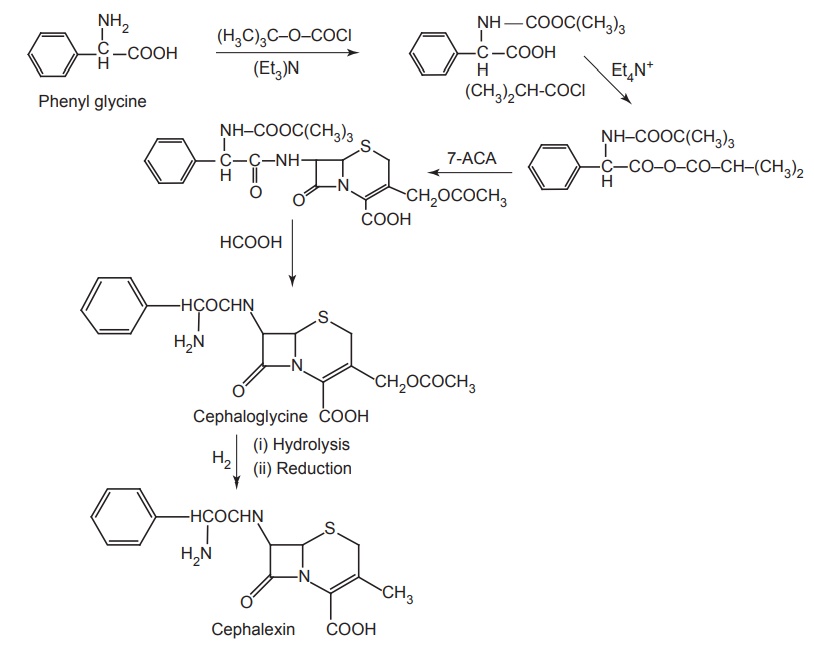
Properties and uses: Cephalexin monohydrate is a white crystalline
powder, sparingly soluble in water, and practically insoluble in alcohol. The α-amino
group of cephalexin renders it acid stable. The 3-methyl group is responsible
for the metabolic stability. It is particularly recommended for urinary tract
infection.
Dose: The oral dose for adults is 250–500 mg every 6 h, for children,
the dose is 18–25mg/kg every 6 h.
Assay: It is assayed by adopting liquid chromatography technique.
Dosage forms: Cefalexin capsules I.P., B.P., Cefalexin oral suspension I.P.,
B.P., Cefalexin tablets I.P., B.P.
ii. Cefadroxil (Cefadrox, Droxyl, Codroxil)
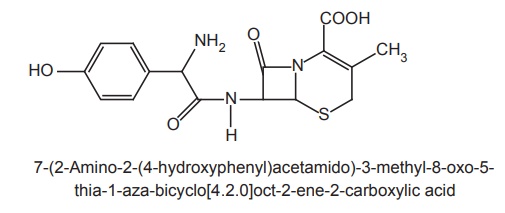
Synthesis
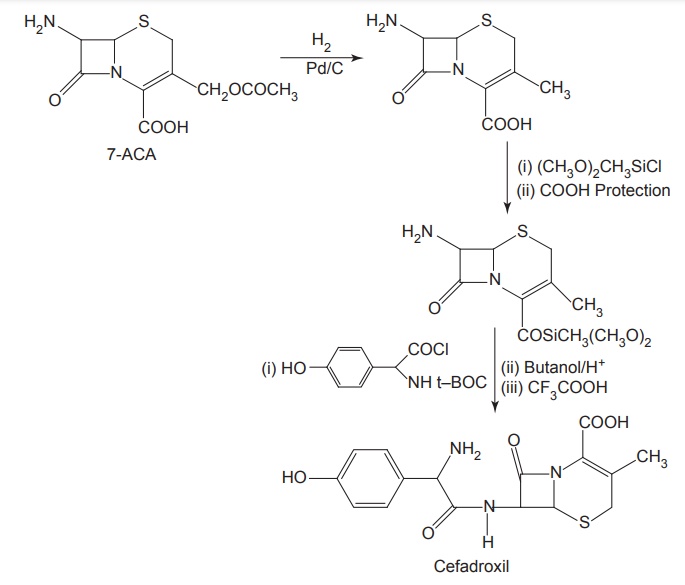
Properties and uses: Cefadroxil monohydrate is a white or almost
white powder, slightly soluble in water, and sparingly soluble in ethanol. The
antibacterial spectrum of action and therapeutic indications of cefadroxil are
very similar to those of cephalexin and cephradine. The D-p-hydroxyphenylglycyl isomer is much
more active than the L-isomer.
Assay: It is assayed by adopting liquid chromatography technique.
Dosage forms: Cefadroxil capsules I.P., B.P., Cefadroxil oral suspension I.P.,
B.P. Cefadroxil tablets I.P.
Dose: In the case of uncomplicated lower urinary tract infections: For
adults, the dose is 1–2 g daily as a single or 2 divided doses. For children
more than 6 years, the dose is 500 mg twice a day, that is, 1–6 years, 250 mg
twice a day; for children less than 1 year, the dose is 25 mg/kg daily in
divided doses. In the case of skin and skin structure infections: For adults,
the dose is 1g per day in single or divided doses. For children, the dose is 30
mg/kg per day in equally divided doses every 12 h. In the case of pharyngitis
and tonsilitis: For adults in the treatment of group A beta-haemolytic
streptococcal pharyngitis and tonsilitis, the dose is 1 g per day in single or divided doses for
10 days. In the case of children, 30 mg/kg per day in equally divided doses
every 12 h for at least 10 days.
iii. Cephalothin (Keflin)

Synthesis

Properties: Cephalothin is a white, odourless, crystalline powder, insoluble
in most organic solvents, soluble in organic solvents and it is acid stable. It
is hygroscopic and decomposes on heating, and it has been described as
broad-spectrum antibacterial compound, it is not in the same class as the tetracyclines.
Its spectrum of activity is broader than that of penicillin G and more similar
to that of ampicillin.
Dose: The dose for adults given IM or IV is equivalent to 500 mg–1 g
every 4 to 6 h; children the dose is 13–26 mg/kg of body weight every 4 h.
iv. Cefsulodin
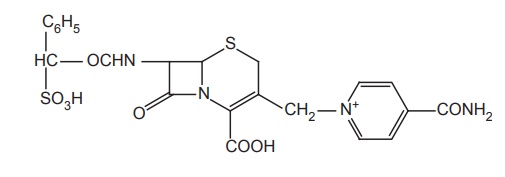
Synthesis
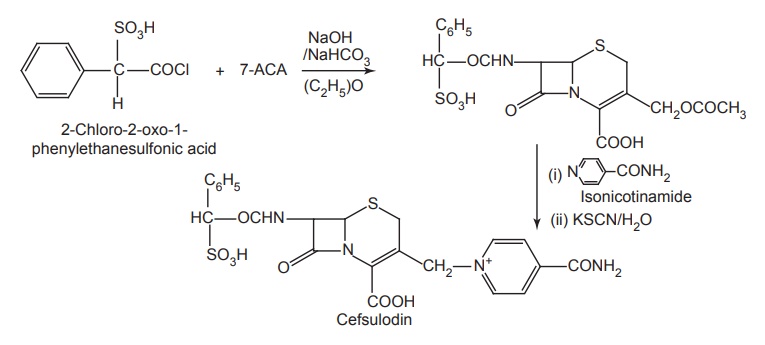
Properties and uses: It is indicated for use in staphylococcal and
pseudomonal infections.
v. Cephradine
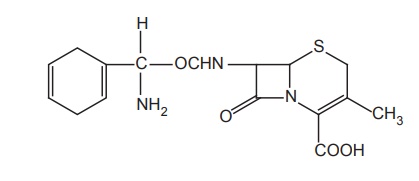
Synthesis
Route-I.
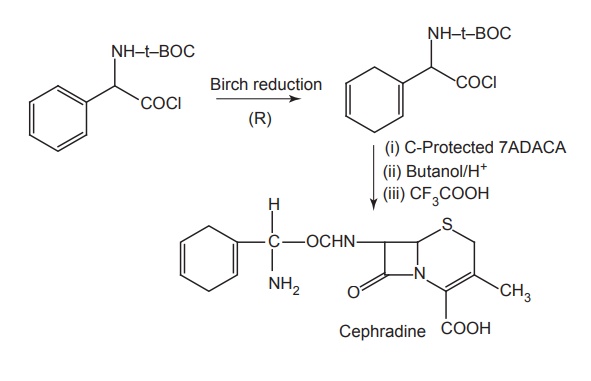
Route-II.
From: 2-Amino-2-phenylacetic acid
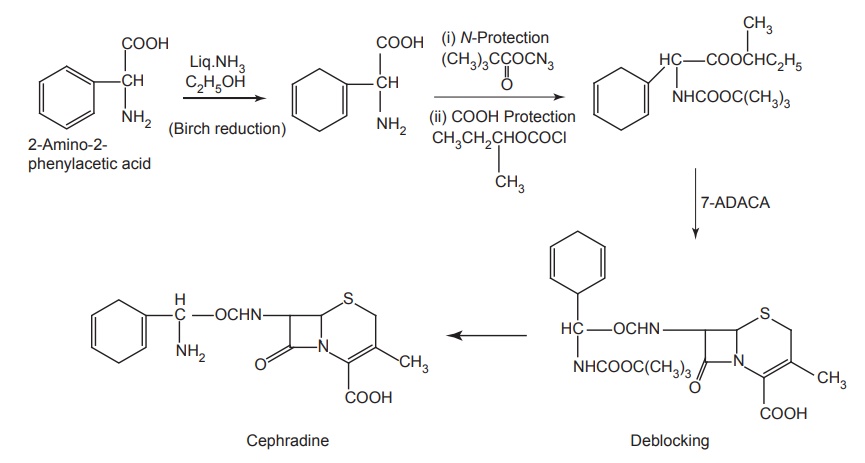
Properties and uses: Cephradine exists as colourless crystals,
soluble in propylene glycol, but slightly soluble in acetone or alcohol. Used as an antibacterial agent.
Related Topics
